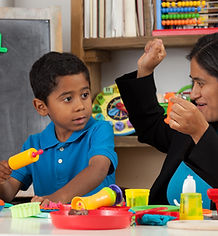
Transformative and Inspiring Learning for
Early Childhood Educators
and the leaders and coaches who support them
All our professional development offerings are packed with real-life tools you can use right away to encourage the behaviors you want—and stop the ones you don’t. Sessions are available both in person and virtually.
Explore upcoming engaging offerings, from keynotes to breakout sessions, by visiting Learn with Raelene. Many topics are also available as interactive, self-paced learning experiences.
These professional development opportunities are consistently highly rated by participants—100% recommended!
All Topics
Book today to bring critical information, infectious enthusiasm, and lasting inspiration to your next training event!
Decrease Stress and Enhance Joy

Decrease Stress, Increase Success, and Enhance Joy, Today
Learn how to train your brain to stress less and enjoy more, no matter what your current situation. Discover practical methods gleaned from the latest neuroscience and social science insight to reduce stress right away, both personally and professionally.
CDA VI: Maintaining a commitment to professionalism
.png)
Finding Joy: Break through barriers and experience the genuine happiness you deserve!
Celebrate your unique gifts and the critical role you have in shaping our next generation. Gain methods to crush the obstacles causing you stress, increase your "joy factor", and feel inspired in your critical work.
CDA VI: Maintaining a commitment to professionalism

Being the Star you Are: Mastering Stressful Moments So You Can Truly Shine!
Explore effective methods to use before, during, and after stressful moments to build the important self-regulation skills needed to prevent future emotional mayhem. Stress can bring out the worst in people, especially little people. Stress is actually a major trigger behind tantrums, aggression, refusals, and other challenging behaviors! How you respond during the tensest moments impacts children’s emotional development but also how you feel about your important work. Develop a plan to confidently address stressful moments so you can truly shine, today and tomorrow.
CDA III: Positive ways to support children’ social and emotional development
Inspiring Terrific Toddlers

Inspiring Terrific Toddlers 1: Why do they DO that?!
Identify social and emotional milestones for children 10-months to 3-years old. Explore the link between toddler’s challenging behaviors and toddler development. Delve deeper into what drives toddlers’ negative behaviors while you gain insight into their cognitive capabilities. Discover three top tips to promote optimal development and growth and get answers to your toddler develop questions.
CDA VIII: Principles of Child Development and Learning

Inspiring Terrific Toddlers 2: Setting Effective Limits and Getting Toddlers to Follow Them
Learn an easy, four-step process to get toddlers to follow your directions. Evaluate which limits are realistic for toddlers and identify the culprits that fuel toddler battles. Identify top tips for setting effective limits with toddlers and gain hands-on tools to teach those limits. Gain constructive communication techniques that really work to get toddlers to stop certain behaviors and start others.
CDA III: Positive ways to support children’ social and emotional development

Inspiring Terrific Toddlers 3: Positive Guidance Strategies for Persistent Toddler Challenges
Explore eight effective toddler discipline strategies to get the behaviors you want and stop those you don’t. Despite your best prevention efforts, toddlers may refuse to listen or continue challenging behaviors. Learn guidance methods that successfully address specific toddler challenging behaviors. Apply the strategies learned as you problem-solve common persistent negative behaviors such as throwing, kicking, climbing, and taking toys, and refusing to listen.
CDA III: Positive ways to support children’ social and emotional development

From Timid To Tenacious - Working With Infant And Toddler Temperament Traits
Discover helpful strategies for working with infants and toddlers who are extremely intense, persistent, sensitive, timid, and highly active. Gain tips to help infants and toddlers not only behave well but also develop the skills needed to thrive.
CDA III: Positive ways to support children’ social and emotional development

Hitting, Kicking, and Biting, OH MY! Top Tips to Address Toddler Aggression
Gain strategies to help toddlers during challenging moments and bolster the skills needed to express emotions appropriately, reduce aggressive behaviors, and increase calm for all in your care environment.
CDA III: Positive ways to support children’ social and emotional development

From “SCREECH” To “More Please” - Fostering Communication Skills in Infants and Toddlers
Gain insight into infants and toddlers develop the critical language skills needed to avoid screaming, throwing food, and other negative behaviors. Explore the tremendous difference adults can make in this advancement.
CDA II: Steps to advance children’s physical and intellectual development

Building Baby’s Brain Power - Caregiving Strategies That Help All Infants Blossom
Gain methods to help infants construct the brain pathways needed to thrive. Explore the amazing things infants are observing and learning about the world around them. Identify caregiving strategies that promote optimal growth and development through sensitive and responsive care. Collect methods to foster trust with helpful routines that reduce upset and promote the infant’s ability to soothe and calm.
CDA VIII: Principles of Child Development and Learning
Transform Challenging Behaviors

Part 1: Prevent Challenges by Diminishing the Fuel that is Igniting the Fires
Learn how typical developmental patterns, stress, trauma, temperament, sleep, and the environment impact children’s behavior and fuel behavior challenges in children aged 3-8 years. Collect strategies to directly address the “why” behind the behavior to reduce negative behaviors. Obtain hands-on teaching tools that will help smooth transitions, build in positive routines, and promote the development of skills the child needs to behave well.
CDA III: Positive ways to support children’ social and emotional development

Part 2: Prevent Challenges and Gain Gleeful Cooperation with Positive Communication Techniques That Work!
Gain numerous strategies to prevent challenging behaviors, reduce power struggles, and promote the behaviors you want in children aged 3-8 years. Explore positive communication techniques that will minimize challenges and successfully redirect negative behaviors while building your relationship with the child. Utilize a positive behavior intervention cheat sheet as a support tool to collect and apply numerous strategies to a common challenge. Apply a process for addressing challenging behaviors using this useful positive behavior intervention support tool with others who care for young children.
CDA III: Positive ways to support children’ social and emotional development

Part 3: Five Powerful Techniques to Successfully Redirect Challenging Behaviors When They Occur.
Explore caregiving approaches that promote respectful behavior, reduce challenging behaviors, and help maintain your valuable connection with children aged 3-8 years. Identify five helpful strategies for addressing challenging behaviors when they occur, redirect negative behavior, and increase positive behavior. The tools learned will take the drama out of discipline and gain compliance in early childhood settings.
CDA III: Positive ways to support children’ social and emotional development

Part 4: Addressing Persistent Challenges with Helpful Positive Discipline Tools that Work!
Explore five positive discipline techniques and apply them to common challenges exhibited by children 3-8 years such as talking back, being mean to others, and not listening. Explore top tips for using logical consequences and breaks to gain cooperation and help children learn to make better choices in the future and realize their great power to influence their own outcomes in a positive way.
CDA III: Positive ways to support children’ social and emotional development

Working with Challenging Behaviors to Get the Behaviors You Want, and Stop Those You Don't!
Learn how typical developmental patterns, stress, sleep, and the environment impact children’s behavior and fuel challenges. Identify positive communication techniques and easy-to-apply guidance methods that will prevent challenging behaviors from occurring, encourage gleeful cooperation, and reduce dreaded power struggles. Utilize a positive behavior intervention support tool you can use to effectively address the challenging behaviors you experience and tailor your response to the individual child’s stage. Obtain hands-on teaching tools that teach children what they need to learn, reduce stress, smooth transitions, build in positive routines, and promote the development of skills the child needs in order to behave well.
CDA III: Positive ways to support children’ social and emotional development

From Timid to Tenacious - Working with Difficult Temperament Traits
Learn about the nine different temperament traits, which determine how a child is naturally wired to respond to the world. Identify which are linked to the challenging behaviors you experience. Discover proven methods to decrease power struggles, reduce negative behaviors and increase positive outcomes for children who are slow to adapt, highly sensitive, or won’t stop moving!
CDA III: Positive ways to support children’ social and emotional development

Feisty, Lively, and Tenacious! Working with Highly Intense and Highly Persistent Children
The reality is, some children are just born magically passionate and delightfully determined. Collect methods to help children learn to manage strong feelings, calm independently, and master the stressful moments they experience.
CDA III: Positive ways to support children’ social and emotional development
Teach the Skills Needed

Promoting Self-Control in Young Children
Gain insight into the development of the higher-level thinking skills known as “Executive Functions”. Learn what can be expected at different ages and adult practices that promote the child’s cognitive capacity to focus, control impulses, and self-regulate. Explore evidence-based strategies that promote the foundation of these critical life-skills during daily interactions and interactive and fun hands-on activities. Problem-solve a common challenge as you identify where the child is on the continuum of cognitive development, explore which strategies will promote the child’s ability to overcome negative or aggressive responses and manage strong emotions, and tools to bolster their success socially and academically, today and tomorrow.
CDA VIII: Principles of Child Development and Learning

Strategies, Tips and Tools to Foster Impulse Control, Focus, & Attention Skills
Explore the development of the critical higher-level thinking skills known as “Executive Functions,” including impulse control, memory, and the child’s ability to focus on a task. Explore evidence-based methods, hands-on tools, fun activities, and games you can implement in your educational setting to encourage the development of these important life skills. Discover strategies to help young children improve self-discipline and develop the attention skills needed to behave well. Apply the strategies learned to a specific common challenging behavior you experience.
CDA VIII: Principles of Child Development and Learning
.png)
Encouraging Emotional Intelligence In Early Childhood
Gain tools to increase children’s capacity to identify feelings, problem-solve, resolve conflicts, empathize, and get along well with others. Learn emotion-coaching strategies to help children through difficult moments.
CDA III: Positive ways to support children’ social and emotional development

Building the Social-Emotional Intelligence Needed to Empathize, Perspective-Take, and Get Along.
Identify strategies to promote emotional intelligence in relationships, including children’s capacity to identify other’s feelings, discern emotional cues, show understanding and empathy, and use helpful responses when experiences conflicts.
CDA III: Positive ways to support children’ social and emotional development

Giving Gifts that last a Lifetime: Healthy Self-Esteem and Self Confidence
Discover methods to foster children's healthy self-esteem and the self-confidence. Promote a growth mindset and confidence. Ensure children not only feel good about themselves but also treat others kindly.
CDA III: Positive ways to support children’ social and emotional development

Happy Helpers- Four Proven methods to Increase Responsibility, Build Confidence, and Improve Children's Behavior
Build important self-confidence and a “can do” attitude in young children. Collect tools to increase self confidence, promote responsibility and gain cooperation.
CDA III: Positive ways to support children’ social and emotional development
Promote Powerful Partnerships

Collaborating with Families Part 1: It’s All About Relationships
Discover strategies to increase positive communication and build treasured relationships with families that leave them valuing your opinion, open to your feedback, and appreciating your important work.
CDA IV: Strategies to establish productive relationships with families

Collaborating with Families Part 2: Communicating Concerns and Challenges
Gain strategies to comfortably discuss concerns and challenging behaviors with families. Identify specific helpful language that will turn these potentially tense conversations into collaborative discussions.
CDA IV: Strategies to establish productive relationships with families

Collaborating with Families Part 3: Thriving Through Different Cultural Dynamics and Conflicting Caregiving Practices
Learn a process to collaboratively resolve conflicts and caregiving differences that inevitably come up when sharing the care and education of young children. Discover methods to address issues in a way that empowers parents and leaves all parties feelings respected and valued.
CDA IV: Strategies to establish productive relationships with families
_edited.jpg)
Communicating Concerns and Challenges with Parents of Infants and Toddlers
Gain strategies to effectively and comfortably discuss developmental concerns, challenging behaviors, and safety guidelines with parents of infants and toddlers. Collect methods to set the stage for these conversations before concerns arise. Identify tips and helpful language that will turn these potentially awkward or tense conversations into comfortable and collaborative discussions. Apply the tools learned to a common real-life scenario you experience. You will increase your confidence and ease with having these sensitive conversations and ensure the discussions keep parents open to your insight, increase parent buy-in, and help maintain your important relationship with parents.
CDA IV: Strategies to establish productive relationships with families

Promoting Powerful Parent Partnerships through Concerns, Challenges, and Conflicts.
Gain insight and strategies to build a robust and rewarding relationship with parents, especially those you find difficult to connect with. Explore methods to effectively communicate about concerns and challenging behaviors that will increase parent’s openness to your suggestions and investment in using helpful, productive strategies. Learn collaborative conflict resolution strategies and apply a process to comfortably resolve conflicts that inevitably come up. You will walk away with strategies you can apply today to build a productive and cooperative relationship that will ensure success for you and the families you work with.
CDA IV: Strategies to establish productive relationships with families

Constructive Parent Communication During Daily Interactions and Difficult Conversations
Explore communication tools and conversation starters you can use during day-to-day interactions and parent meetings to set the stage and build a collaborative working relationship. Gain tools to confidently, calmly, and comfortably have difficult conversations with parents about behavioral concerns. Discover methods to diffuse tense situations and productively communicate with stressed, demanding, sensitive, and sometimes explosive parents. Explore specific questions and statements you can use that build a positive connection with parents as you problem-solve challenges together and work toward shared goals and increased consistency between home and your care. Practice and apply the methods learned to real-life scenarios in your work with parents.
CDA IV: Strategies to establish productive relationships with families

Creating a Cohesive and Collaborative Caregiving Team
Identify tips to increase positive communication and a team approach in your caregiving environment. Gain tools to confidently and comfortably have difficult conversations with coworkers about concerns. Learn a process for collaboratively problem-solving challenges together in a way that builds your work relationship and reduces challenging behaviors.
CDA IV: Strategies to establish productive relationships with families
Dynamic and Successful Leadership

Mastering the Moves - Delivering Impactful Learning Opportunities with Finesse, Confidence, and Calm
Uncover the verbal and nonverbal techniques that influential presenters and facilitators use. Gain insight into how to use body language, tone of voice, and other subtle physical behavior to convey credibility, capture attention, and support learning. Identify helpful responses to common challenges such as distraction, lack of engagement, overt or covert disagreement with your viewpoint, and loss of connection with your group. You will walk away with many strategies to increase your confidence and enhance your impact, whether you are a beginner or a seasoned veteran.
CDA VI: Maintaining a commitment to professionalism
.png)
Decrease Stress, Increase Success as Leader and Coach
Experience a unique parallel learning process as you identify the impact of stress on your thinking and responses during stressful situations you run into as a leader. Learn hands-on-methods to train your brain to stress less and enjoy more. Apply those stress-busting strategies to your specific work as a leader. Experience a variety of training techniques and reflect on how you could use these in your staff trainings.
CDA VI: Maintaining a commitment to professionalism

Winning Participants Over and Making an Impact with the Power of Your Stories
Identify the why, when, what, and how of great storytelling. Observe, analyze, and gain knowledge from the presenter and video examples of successful speakers telling their stories. Consider which types of stories might work best for the topic you are passionate about and identify the why, how, and where you might share that story. Explore methods to tell your story that will build critical rapport and credibility with your group, keeping participants open to your message and leave your audience with greater understanding and support for the ideas you are delivering.
CDA VI: Maintaining a commitment to professionalism

Who me?! Lead a Staff?! - From Surviving to Thriving in Your Leadership Role.
Identify common challenges of moving into a leadership role. Learn common beginner "traps". Explore evidence-based strategies for successful leadership.
CDA VI: Maintaining a commitment to professionalism

Building a Strong Team During Everyday Moments and Meetings
Explore the team building principles used by successful leaders to develop a strong and committed crew. Identify common challenges and barriers to team building. Gain strategies, activities, and processes you can use to build bonds and create a climate that ensures you retain valuable staff and help your program thrive.
CDA VI: Maintaining a commitment to professionalism

Support for Your Critical Leadership Role
Be your best, retain staff. Adapt proven management strategies that really work. Identify common challenges of moving into a leadership role. Learn common beginner "traps". Explore evidence -based strategies for successful leadership
CDA VI: Maintaining a commitment to professionalism
WHAT PARTICIPANTS SAY

BEST TRAINING EVER!
"Raelene is amazing!
Great class, lots of energy, fun, and great information!"
– Head Start teacher

PROFESSIONAL & INFORMATIVE
"Forty-plus years as a provider and many, many conferences and this is my favorite. Perfect, professional, informative. I can't wait to attend again and again."
— Nancy Ostergaard,
Childcare provider

MY EXPERIENCE WAS AMAZING!
"This workshop gave me so much awesome insight on how I do my job as a professional childcare provider and how I can help children grow in this ever-so-crazy world."
— Chrystal Hulkriede
Have fun learning in-person, live webinar, or engaging self-paced anytime!





